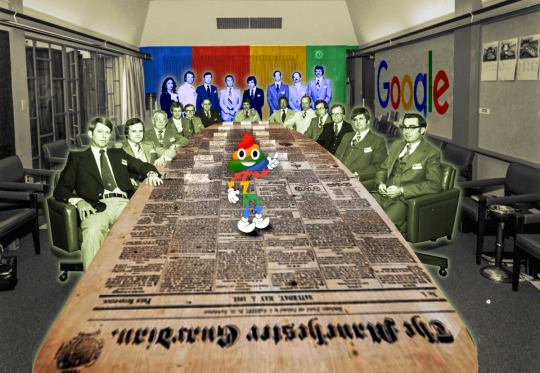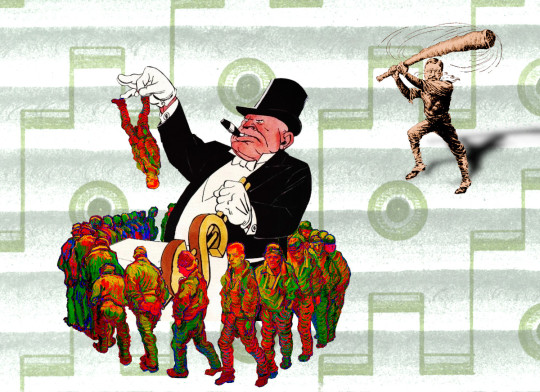#competitive markets
Explore tagged Tumblr posts
Text
youtube
How to Fight Monopoly Power with FTC Chair Lina Khan - Factually! - 234 by Adam Conover
#interviews#ftc#realitystuff#finally some good news#adam conover#lena khan#antitrust#monopolies#economy#competitive markets#competition#non compete clauses#constitutional rights#corporations#Youtube
0 notes
Text
UK publishers suing Google for $17.4b over rigged ad markets

THIS WEEKEND (June 7–9), I'm in AMHERST, NEW YORK to keynote the 25th Annual Media Ecology Association Convention and accept the Neil Postman Award for Career Achievement in Public Intellectual Activity.

Look, no one wants to kick Big Tech to the curb more than I do, but, also: it's good that Google indexes the news so people can find it, and it's good that Facebook provides forums where people can talk about the news.
It's not news if you can't find it. It's not news if you can't talk about it. We don't call information you can't find or discuss "news" – we call it "secrets."
And yet, the most popular – and widely deployed – anti-Big Tech tactic promulgated by the news industry and supported by many of my fellow trustbusters is premised on making Big Tech pay to index the news and/or provide a forum to discuss news articles. These "news bargaining codes" (or, less charitably, "link taxes") have been mooted or introduced in the EU, France, Spain, Australia, and Canada. There are proposals to introduce these in the US (through the JCPA) and in California (the CJPA).
These US bills are probably dead on arrival, for reasons that can be easily understood by the Canadian experience with them. After Canada introduced Bill C-18 – its own news bargaining code – Meta did exactly what it had done in many other places where this had been tried: blocked all news from Facebook, Instagram, Threads, and other Meta properties.
This has been a disaster for the news industry and a disaster for Canadians' ability to discuss the news. Oh, it makes Meta look like assholes, too, but Meta is the poster child for "too big to care" and is palpably indifferent to the PR costs of this boycott.
Frustrated lawmakers are now trying to figure out what to do next. The most common proposal is to order Meta to carry the news. Canadians should be worried about this, because the next government will almost certainly be helmed by the far-right conspiratorialist culture warrior Pierre Poilievre, who will doubtless use this power to order Facebook to platform "news sites" to give prominence to Canada's rotten bushel of crypto-fascist (and openly fascist) "news" sites.
Americans should worry about this too. A Donald Trump 2028 presidency combined with a must-carry rule for news would see Trump's cabinet appointees deciding what is (and is not) news, and ordering large social media platforms to cram the Daily Caller (or, you know, the Daily Stormer) into our eyeballs.
But there's another, more fundamental reason that must-carry is incompatible with the American system: the First Amendment. The government simply can't issue a blanket legal order to platforms requiring them to carry certain speech. They can strongly encourage it. A court can order limited compelled speech (say, a retraction following a finding of libel). Under emergency conditions, the government might be able to compel the transmission of urgent messages. But there's just no way the First Amendment can be squared with a blanket, ongoing order issued by the government to communications platforms requiring them to reproduce, and make available, everything published by some collection of their favorite news outlets.
This might also be illegal in Canada, but it's harder to be definitive. The Canadian Charter of Rights and Freedoms was enshrined in 1982, and Canada's Supreme Court is still figuring out what it means. Section Two of the Charter enshrines a free expression right, but it's worded in less absolute terms than the First Amendment, and that's deliberate. During the debate over the wording of the Charter, Canadian scholars and policymakers specifically invoked problems with First Amendment absolutism and tried to chart a middle course between strong protections for free expression and problems with the First Amendment's brook-no-exceptions language.
So maybe Canada's Supreme Court would find a must-carry order to Meta to be a violation of the Charter, but it's hard to say for sure. The Charter is both young and ambiguous, so it's harder to be definitive about what it would say about this hypothetical. But when it comes to the US and the First Amendment, that's categorically untrue. The US Constitution is centuries older than the Canadian Charter, and the First Amendment is extremely definitive, and there are reams of precedent interpreting it. The JPCA and CJPA are totally incompatible with the US Constitution. Passing them isn't as silly as passing a law declaring that Pi equals three or that water isn't wet, but it's in the neighborhood.
But all that isn't to say that the news industry shouldn't be attacking Big Tech. Far from it. Big Tech compulsively steals from the news!
But what Big Tech steals from the news isn't content.
It's money.
Big Tech steals money from the news. Take social media: when a news outlet invests in building a subscriber base on a social media platform, they're giving that platform a stick to beat them with. The more subscribers you have on social media, the more you'll be willing to pay to reach those subscribers, and the more incentive there is for the platform to suppress the reach of your articles unless you pay to "boost" your content.
This is plainly fraudulent. When I sign up to follow a news outlet on a social media site, I'm telling the platform to show me the things the news outlet publishes. When the platform uses that subscription as the basis for a blackmail plot, holding my desire to read the news to ransom, they are breaking their implied promise to me to show me the things I asked to see:
https://www.eff.org/deeplinks/2023/06/save-news-we-need-end-end-web
This is stealing money from the news. It's the definition of an "unfair method of competition." Article 5 of the Federal Trade Commission Act gives the FTC the power to step in and ban this practice, and they should:
https://pluralistic.net/2023/01/10/the-courage-to-govern/#whos-in-charge
Big Tech also steals money from the news via the App Tax: the 30% rake that the mobile OS duopoly (Apple/Google) requires for every in-app purchase (Apple/Google also have policies that punish app vendors who take you to the web to make payments without paying the App Tax). 30% out of every subscriber dollar sent via an app is highway robbery! By contrast, the hyperconcentrated, price-gouging payment processing cartel charges 2-5% – about a tenth of the Big Tech tax. This is Big Tech stealing money from the news:
https://www.eff.org/deeplinks/2023/06/save-news-we-must-open-app-stores
Finally, Big Tech steals money by monopolizing the ad market. The Google-Meta ad duopoly takes 51% out of every ad-dollar spent. The historic share going to advertising "intermediaries" is 10-15%. In other words, Google/Meta cornered the market on ads and then tripled the bite they were taking out of publishers' advertising revenue. They even have an illegal, collusive arrangement to rig this market, codenamed "Jedi Blue":
https://en.wikipedia.org/wiki/Jedi_Blue
There's two ways to unrig the ad market, and we should do both of them.
First, we should trustbust both Google and Meta and force them to sell off parts of their advertising businesses. Currently, both Google and Meta operate a "full stack" of ad services. They have an arm that represents advertisers buying space for ads. Another arm represents publishers selling space to advertisers. A third arm operates the marketplace where these sales take place. All three arms collect fees. On top of that: Google/Meta are both publishers and advertisers, competing with their own customers!
This is as if you were in court for a divorce and you discovered that the same lawyer representing your soon-to-be ex was also representing you…while serving as the judge…and trying to match with you both on Tinder. It shouldn't surprise you if at the end of that divorce, the court ruled that the family home should go to the lawyer.
So yeah, we should break up ad-tech:
https://www.eff.org/deeplinks/2023/05/save-news-we-must-shatter-ad-tech
Also: we should ban surveillance advertising. Surveillance advertising gives ad-tech companies a permanent advantage over publishers. Ad-tech will always know more about readers' behavior than publishers do, because Big Tech engages in continuous, highly invasive surveillance of every internet user in the world. Surveillance ads perform a little better than "content-based ads" (ads sold based on the content of a web-page, not the behavior of the person looking at the page), but publishers will always know more about their content than ad-tech does. That means that even if content-based ads command a slightly lower price than surveillance ads, a much larger share of that payment will go to publishers:
https://www.eff.org/deeplinks/2023/05/save-news-we-must-ban-surveillance-advertising
Banning surveillance advertising isn't just good business, it's good politics. The potential coalition for banning surveillance ads is everyone who is harmed by commercial surveillance. That's a coalition that's orders of magnitude larger than the pool of people who merely care about fairness in the ad/news industries. It's everyone who's worried about their grandparents being brainwashed on Facebook, or their teens becoming anorexic because of Instagram. It includes people angry about deepfake porn, and people angry about Black Lives Matter protesters' identities being handed to the cops by Google (see also: Jan 6 insurrectionists).
It also includes everyone who discovers that they're paying higher prices because a vendor is using surveillance data to determine how much they'll pay – like when McDonald's raises the price of your "meal deal" on your payday, based on the assumption that you will spend more when your bank account is at its highest monthly level:
https://pluralistic.net/2024/06/05/your-price-named/#privacy-first-again
Attacking Big Tech for stealing money is much smarter than pretending that the problem is Big Tech stealing content. We want Big Tech to make the news easy to find and discuss. We just want them to stop pocketing 30 cents out of every subscriber dollar and 51 cents out of ever ad dollar, and ransoming subscribers' social media subscriptions to extort publishers.
And there's amazing news on this front: a consortium of UK web-publishers called Ad Tech Collective Action has just triumphed in a high-stakes proceeding, and can now go ahead with a suit against Google, seeking damages of GBP13.6b ($17.4b) for the rigged ad-tech market:
https://www.reuters.com/technology/17-bln-uk-adtech-lawsuit-against-google-can-go-ahead-tribunal-rules-2024-06-05/
The ruling, from the Competition Appeal Tribunal, paves the way for a frontal assault on the thing Big Tech actually steals from publishers: money, not content.
This is exactly what publishing should be doing. Targeting the method by which tech steals from the news is a benefit to all kinds of news organizations, including the independent, journalist-owned publishers that are doing the best news work today. These independents do not have the same interests as corporate news, which is dominated by hedge funds and private equity raiders, who have spent decades buying up and hollowing out news outlets, and blaming the resulting decline in readership and profits on Craiglist.
You can read more about Big Finance's raid on the news in Margot Susca's Hedged: How Private Investment Funds Helped Destroy American Newspapers and Undermine Democracy:
https://www.press.uillinois.edu/books/?id=p087561
You can also watch/listen to Adam Conover's excellent interview with Susca:
https://www.youtube.com/watch?v=N21YfWy0-bA
Frankly, the looters and billionaires who bought and gutted our great papers are no more interested in the health of the news industry or democracy than Big Tech is. We should care about the news and the workers who produce the news, not the profits of the hedge-funds that own the news. An assault on Big Tech's monetary theft levels the playing field, making it easier for news workers and indies to compete directly with financialized news outlets and billionaire playthings, by letting indies keep more of every ad-dollar and more of every subscriber-dollar – and to reach their subscribers without paying ransom to social media.
Ending monetary theft – rather than licensing news search and discussion – is something that workers are far more interested in than their bosses. Any time you see workers and their bosses on the same side as a fight against Big Tech, you should look more closely. Bosses are not on their workers' side. If bosses get more money out of Big Tech, they will not share those gains with workers unless someone forces them to.
That's where antitrust comes in. Antitrust is designed to strike at power, and enforcers have broad authority to blunt the power of corporate juggernauts. Remember Article 5 of the FTC Act, the one that lets the FTC block "unfair methods of competition?" FTC Chair Lina Khan has proposed using it to regulate training AI, specifically to craft rules that address the labor and privacy issues with AI:
https://www.youtube.com/watch?v=3mh8Z5pcJpg
This is an approach that can put creative workers where they belong, in a coalition with other workers, rather than with their bosses. The copyright approach to curbing AI training is beloved of the same media companies that are eagerly screwing their workers. If we manage to make copyright – a transferrable right that a worker can be forced to turn over their employer – into the system that regulates AI training, it won't stop training. It'll just trigger every entertainment company changing their boilerplate contract so that creative workers have to sign over their AI rights or be shown the door:
https://pluralistic.net/2024/05/13/spooky-action-at-a-close-up/#invisible-hand
Then those same entertainment and news companies will train AI models and try to fire most of their workers and slash the pay of the remainder using those models' output. Using copyright to regulate AI training makes changes to who gets to benefit from workers' misery, shifting some of our stolen wages from AI companies to entertainment companies. But it won't stop them from ruining our lives.
By contrast, focusing on actual labor rights – say, through an FTCA 5 rulemaking – has the potential to protect those rights from all parties, and puts us on the same side as call-center workers, train drivers, radiologists and anyone else whose wages are being targeted by AI companies and their customers.
Policy fights are a recurring monkey's paw nightmare in which we try to do something to fight corruption and bullying, only to be outmaneuvered by corrupt bullies. Making good policy is no guarantee of a good outcome, but it sure helps – and good policy starts with targeting the thing you want to fix. If we're worried that news is being financially starved by Big Tech, then we should go after the money, not the links.

If you'd like an essay-formatted version of this post to read or share, here's a link to it on pluralistic.net, my surveillance-free, ad-free, tracker-free blog:
https://pluralistic.net/2024/06/06/stealing-money-not-content/#content-free
#pluralistic#competition#advertising#surveillance advertising#saving the news from big tech#link taxes#trustbusting#competition and markets authority#uk#ukpoli#Ad Tech Collective Action#digital markets unit#Competition Appeal Tribunal
584 notes
·
View notes
Text
Nintendo filed for the patent after Palworld was already out. In fact, the feature was already in several games before Pokemon.
So they legally stole an idea and are suing people for using such a broad concept of said idea.
Oh! And now they're taking down people's Channels for making videos about emulation (This (Emulation) has long be established as Legal? Legal. Bastards.)
If Nintendo wins this lawsuit, Japanese companies are going to patent Eeeverything and start suing Eeeeveryooone.
Nintendo Needs To Lose So Hard They Lose The Patent. Genuinely anything else? Kills the games industry.
Nintendo is willing to, Once, Again, Throw the entire Industry under the bus for Just A Bit More Money. These fuckers aren't even competing with Anyone, they just want to destroy competition. Remember what became the ESRB trials? Did you watch those? Because that was the first time Nintendo put the industry into uncertainty and censorship Just To Spite Their One Competition, Sega. Had the US government not been reasonable? And say "regulate yourselves" Gaming would have died.
Nintendo is absolutely disgusting, pathetic, incapable of competing with even it's own fans without pulling a gun on them, but hell has no fury like Nintendo's legal team seeing anything thay challenges Nintendo's perfect little image.
Please. Do Not Support Nintendo Anymore. If you care about Art, Creation, people's Careers, yourself and your friends, you will choose to harm Nintendo'a BottomLine by no longer giving them money, by talking shit online. Nothing else will work.
If Japanese courts take Nintendo's side, nothing will stop companies from patenting first person shooters, from patenting platformers, from patenting MOBA's, nothing is safe.
What Nintendo has effectively started is quite literally the end of gaming. They're Attacking Indie developers, they're attacking all artists of all sectors, they're attacking your ability to create, they're attacking people's livelihood, they're attacking everything built up over the course of nearly 6 decades, just to spite One Fucking Game.
#palworld#Nintendo#honestly if you're not scared you're not informed#literally the only way to stop this is if the consumer fights back#we are the other half of the free market There Is No Other Regulator Not One 0 Zilch Nada Nope#only us#of we do nothing? They win by default#straight up Japanese copyright/legal/patent is dumb as shit and there's 0 reliability#Nintendo needs to drop this fucking childish bullshir#and we need to focus on killing their Patent#pokemon#nintendo#gaming industry#I've been saying it for years now ya'll#actually since childhood so a decade minimum#Don't Support These Companies#don't support console gaming because all the big boys are dreadful for the industrt#and who else but Nintendo would come first to prove that the entire industry needa regulation so fucking hard#To support gaming you really need to push for it to be open for anyone to be involved with#Nintendo on the other hand thinks randomly filing patents at anytime should enable them to attack even the smallest of competition#Really consider the company you probably barely think about since it stop trying to compete with literally anyone#is being so anti-competitive. Not towards a console. But all of the industry#this today a nobody fuckin company#really thinks they should have such dominance of the industry#fuck Nintendo
90 notes
·
View notes
Text

#salamence#THIS one is a good one. someone else mentioned the chin and claimed they look like lord farquaad. and would say “why YES this is Divine” and#i didn't like how accurate that was. anyway dragon/flying 4x weakness to ice my belovèd. if anyone says ice is bad#keep in mind how much of the competitive landscape it totally nullifies. ice is like. probably my second favorite type. behind electric#even though none of this is about salamence. they've got the whole primary colors thing going on but minus yellow#red and blue. red white and blue. american pokémon? big red wings that're just Flat. i really dunno what's happening here i just know it's#supposed to be really good in competitive. and also they got a paradox form which i Guess TPC is trying to market as totally new unrelated#pokémon but i'm always going to call them “paradox hariyama” and such instead of ~iron hands~ or whatever they're supposed to be called#don't want my pokémon names to have two words in them……
688 notes
·
View notes
Text



Some sketches inspired by @theunqualified1's fic Chalk It Up To Luck You can find some more drawings for this AU here
also little bonus bc i had to figure out their uniforms:

#critical role#critical role c3#imogen temult#laudna cr#imodna#my art#my stuff#Chalk It Up To Luck fic#drawing things for this au was so much fun#and figuring out the uniforms was also nice#don't know shit about bouldering tho so don't come for me pls#anyway some little details about this#the symbol on the chest of their uniform is the republic of tal'dorei's symbol#and i think you guys can recognize most of the things on the backdrop of the interview but#it's the m9 logo the ashari symbol the moons ofc#and that big A is a market thing#since that competition takes place in market#i found this handy little chart on the wiki with a bunch of exandria's symbols in it and that was very helpful
85 notes
·
View notes
Text











chinese guzhuang fashion
#young actress and actors are cornering the guzhuang market#that's why the industry is becoming more and more competitive#when it comes to guzhuang idol dramas/guouju古偶剧 with fantasy elements(like xianxia dramas)#cnetizens are bored with the same old faces#media has found that young actress and actors (20-27 years old) especially new pretty faces are more appealing to viewers#cnetizens can actually be mean to actress and actors (over 33 years old) cast as lead characters in guzhuang idol dramas#reasons is that lead characters are usually portrayed as teenagers or really young people#and the audience find it very weird to have middle-aged people cast such characters#especially scripts are usually adapted based on fictions#so fans of the novels would be furious about such casting#besides cnetizens want to see normal aging faces#but these shows always use excessive filters and PS#causing the midle-aged faces to be fake and weird#i once saw really mean comments on douyin for xianxia dramas casting middle-aged actress getting over one hundred thousand likes#actress and actors in zhengju正剧 guzhuang dramas or luodi落地 guzhuang dramas are not affected by this#like telling a realistic down-to-earth story or story inspired by real history or related to folks#and there is no fantasy or xianxia elements#china#fashion#chinese fashion#guzhuang#cdramas
314 notes
·
View notes
Text






It's just, I only just got here again, and I'm--
I'm starving, too, like...
#greg hirsch#i went to market#all the bells say#tomgreg#this is clearly something greg says bc he's actively trying to show more self worth - but also as a beg for love#like 'give me a REASON'#tell me you don't just need me but WANT me#and what's interesting is that while these scenes basically yell to the audience Greg Is Important To The Plot#both scenes also make it clear that greg is not in fact important in the way he's claiming to be#kendall makes a point of getting ewan a ride but NOT for greg's sake - it's entirely for his own benefit#bc of a larger plan that greg has nothing to do with#and in all the bells say greg wants to assert that tom has competition wrt keeping him#and tom shoots down that competition#but the truth is there really wasn't any. greg is important - a big deal - ONLY to tom#tom's the one who will choose him and keep him fed and treat him as someone important#mine
36 notes
·
View notes
Text
It's a weird sort of defeatism I see whenever there's a story about a country in the global south discovering large reserves of some critical mineral or resource where people automatically go "oh no that's terrible for them" as if the "resource curse" is something that just passively happens instead of the results of active decisions by Imperialist Monopolistic Capital
Discovery of a resource to be exploited should - and moreover *can* - be a beacon of hope for increasing domestic manufacturing & moving local industry higher up the value chain & building qualitatively higher productive capacity without the need to service foreign speculative Capital.
#one day soon we will see congolese manufactured phones enter the global market#bolivian EVs will be competitive with Tesla#and cheaper
85 notes
·
View notes
Text

UK 1987
#UK1987#KEMPSTON#DYNBAMICS MARKETING LTD.#HARDWARE#CONTROLLERS#AMSTRAD#C64#ATARI400/800#AMIGA#ATARIst#COMPETITION PRO JOYSTICK
36 notes
·
View notes
Text
Ever notice how it's "most women have gone through sexual harassment and assault even though most men claim to not personally know any rapists, a high chance that all men cover for their predatory friends and should be held accountable" even with men who haven't committed sexual assault, but when it's time for women to be held accountable for supporting and dating rapists, it's "women are not responsible for men's actions"? I have...
#and women do absolutely benefit from rape because it's an effective way to remove competition on the “dating market”#an attractive woman gets a tad too traumatized after an event like that and can't stand men anymore#boom more chances for another woman to bag a man...
14 notes
·
View notes
Text
horse game economy is pissing me off because all the best horses are in the hands of like 3 players who absolutely control the thoroughbred market and the gap between their horses' and an average player's horses' genetics is so huge you basically have no chance to beat them at all
#how should i establish a foothold in the horse market like that. they're not even willing to trade breedable horses. and they ask for like#10k real money!!!!! for a neutered ass horse#djdj im only pissed because this way you'll never win the big competition#that gives you 400 gems/win#i wanna get into the vip horse breeder circle so bad bro#anyway rhrj sorry about the horse economy rant#rambling
7 notes
·
View notes
Text
Worker misclassification is a competition issue

If you'd like an essay-formatted version of this post to read or share, here's a link to it on pluralistic.net, my surveillance-free, ad-free, tracker-free blog:
https://pluralistic.net/2024/02/02/upward-redistribution/#bedoya

The brains behind Trump's stolen Supreme Court have detailed plans: they didn't just scheme to pack the court with judges who weren't qualified for – or entitled to – a SCOTUS life-tenure, they also set up a series of cases for that radical court to hear.
Obviously, Dobbs was the big one, but it's only part of a whole procession of trumped-up cases designed to give the court a chance to overturn decades of settled law and create zones of impunity for America's oligarchs and the monopolies that provide them with wealth and power.
One of these cases is Jarkesy, a case designed to allow SCOTUS to euthanize every agency in the US government, stripping them of their powers to fight corporate crime:
https://www.americanprogress.org/article/sec-v-jarkesy-the-threat-to-congressional-and-agency-authority/
The argument goes, "Congress had the power to spell out every possible problem an agency might deal with and to create a list of everything they were allowed to do about these problems. If they didn't, then the agency isn't allowed to act."
This is an Objectively Very Stupid argument, and it takes a heroic act of motivated reasoning to buy it. The whole point of expert agencies is that they're experts and that they might discover new problems in American life, and come up with productive ways of fixing them. If the only way for an agency to address a problem is to wait for Congress to notice it and pass a law about it, then we don't even need agencies – Congress can just be the regulator, as well as the lawmaker.
If there was any doubt that Congress created the agencies as flexible and adaptive hedges against new threats and problems, then the legislative history of the FTC Act should dispel it.
Congress created the FTC through the FTCA because the courts kept misinterpreting its existing antitrust laws, like the Sherman Act. Companies would engage in the most obvious acts of naked, catastrophic fuckery, and judges would say, "Welp, because Congress didn't specifically ban this conduct, I guess it's OK."
So Congress created the FTC with an Act that included a broad authority to investigate and punish "unfair methods of competition." They didn't spell these out – instead, they explicitly said (in Section 5) that it was the FTC's job to determine whether something was unfair, and to act on it:
https://pluralistic.net/2023/01/10/the-courage-to-govern/#whos-in-charge
The job of the FTC is to investigate unfair conduct before it becomes such a problem that Congress takes action, and to head that conduct off so that it never rises to the level of needing Congressional intervention.
Now, it's true that since the Reagan years, the FTC has grown progressively less interested in using this power, but that's broadly true of all of America's corporate watchdogs. But as the public all over the world has grown ever more furious about corporate abuses and oligarchic wealth, governments everywhere have rediscovered their role as a public protector.
In America, the Biden administration altered the course of history with the appointment of new enforcers in the key anti-monopoly agencies: the FTC and the DOJ's antitrust division. But more importantly, the Biden admin created a detailed, technical plan to use every agency's powers to fight monopoly, in a "whole of government" approach:
https://www.eff.org/deeplinks/2021/08/party-its-1979-og-antitrust-back-baby
Now, this can give rise to seeming redundancies. Take labor issues. The NLRB is a (potentially) powerful regulator that had been in a coma for decades, but has awoken and taken up labor rights with a fervor and cunning that is a delight to behold:
https://pluralistic.net/2023/09/06/goons-ginks-and-company-finks/#if-blood-be-the-price-of-your-cursed-wealth
At the same time, the FTC has also taken up labor rights, using its much broader powers to do things like ban noncompetes nationwide, unshackling workers from bosses who claim the right to veto who else they can work for:
https://pluralistic.net/2022/02/02/its-the-economy-stupid/#neofeudal
But the NLRB doesn't make the FTC redundant, or vice-versa. The NLRB's role is principally reactive, punishing wrongdoing after it occurs. But the FTC has the power to intervene in incipient harms, labor abuses that have not yet risen to the level of NLRB enforcement or new acts of Congress.
This case is made beautifully in Alvaro Bedoya's speech "'Overawed': Worker Misclassification as a Potential Unfair Method of Competition," delivered to the Law Leaders Global Summit in Miami today:
https://www.ftc.gov/system/files/ftc_gov/pdf/Overawed-Speech-02-02-2024.pdf
Bedoya describes why the FTC has turned its attention to the problem of "worker misclassification," in which employees are falsely claimed to be contractors, and thus deprived of the rights that workers are entitled to. Worker misclassification is rampant, and it transfers billions from workers to employers every year. As Bedoya says, 10-30% of employers engage in worker misclassification, allowing them to dodge payment for overtime, Social Security, workers' comp, unemployment insurance, healthcare, retirement and even a minimum wage. Each misclassified worker is between $6k-18k poorer thanks to this scam – a typical misclassified worker sees a one third decline in their earning power. And, of course, each misclassified worker's boss is $6k-$18k richer because of this scam.
It's not just wages, it's workplace safety. One of the most dangerous jobs in the country is construction worker, and worker misclassification is rampant in the sector. That means that construction workers are three times more likely than other workers to lack health insurance.
What's more, misclassified workers can't form unions, because their bosses' fiction treats them as independent contractors, not employees, which means that misclassified construction workers can't join trade unions and demand health-care, or safer workplaces.
Contrast this with, say, cops, who have powerful "unions" that afford them gold-plated health care and lavish compensation, even for imaginary ailments like "contact overdoses" from touching fentanyl – a medical impossibility that still entitles our nation's armed bureaucrats to handsome public compensation:
https://pluralistic.net/2022/01/27/extraordinary-popular-delusions/#onshore-havana-syndrome
Cops have far safer jobs than construction workers, but cops don't get misclassified, so they are able to collect benefits that no other worker – public or private – can hope for.
Not every employer wants to cheat and maim their employees, of course. In Bedoya's speech, he references Sandie Domando, an executive VP at a construction company in Palm Beach Gardens. Domando's company keeps its employees on its books, giving them health-care and other benefits. But when she started bidding against rival firms for jobs funded by the covid stimulus, she couldn't compete – two thirds of those jobs went to other firms that were able to put in cheaper bids. Those bids were cheaper because they were defrauding their workers by misclassifying them. Thus, publicly funded projects were overwhelmingly handed over to fraudulent companies. Fraud becomes a fitness-factor for winning jobs. It's a market for lemons – among employers.
Employee misclassification is a pure transfer from workers to bosses. Bedoya recounts the story of Samuel Talavera, Jr, a short-haul trucker who worked for decades in the Port of Los Angeles. For decades, his job paid well: enough to support his family and even take his kids to Disneyland now and again.
But in 2010, his employer reclassified him as a contractor. They ordered him to buy a new truck – which they financed on a lease-purchase basis – and put him to work for 16 hours stretches in shifts lasting as much as 20 hours per day. Talavera couldn't pick his own hours or pick his routes, but he was still treated as an independent contractor for payroll and labor protection purposes.
This lead to an terrible decline in Talavera's working conditions. He gave up going home between shifts, sleeping in his cab instead. His pay dropped through the floor, thanks to junk-fees that relied on the fiction that he was a contractor. For example, his boss started to charge him rent on the space his truck took up while he was standing by for a job at the port. Other truckers at the port saw paycheck deductions for the toilet-paper in the bathrooms!
Talavera's take-home pay dropped so low that he was bringing home a weekly wage of $112 or $33 (one week, his pay amounted to $0.67). His wife had to work three jobs, and they still had to declare bankruptcy to avoid losing their home. When Talavera's truck needed repairs he couldn't afford, his boss fired him and took back the truck, and Talavera was out the $78,000 he'd paid into it on the lease-purchase plan.
This story – and the many, many others like it from the Port of LA – paint a clear picture of the transfer of wealth from workers to their bosses that comes with worker misclassification. The work that Talavera did in the Port of LA didn't get less valuable when he was misclassified – but the share of that value that Talavera received dropped to as little as $0.67/week.
Worker misclassification is rampant across many sectors, but its handmaiden is technology. The fiction of independence is much easier to maintain when the fine-grained employer-employee control is mediated by an app (think of Uber):
https://pluralistic.net/2023/04/12/algorithmic-wage-discrimination/#fishers-of-men
That's why those scare-stories that AI trucks were going to make truckers obsolete and create an employment crisis were such toxic nonsense. Not only are we unlikely to see self-driving trucks, but the same investors that back AI technology are making bank on companies that practice worker misclassification through the "it's not a crime if we do it with an app" gambit:
https://pluralistic.net/2024/01/11/robots-stole-my-jerb/#computer-says-no
By focusing our attention on a hypothetical employment crisis that will supposedly be caused by future AI developments, tech investors can distract us from the real employment crisis that's created by app-enabled worker misclassification, which is also the source of much of the capital they're plowing into AI.
That's why the FTC's work on misclassification is so urgent. Misclassification is a scam that hurts workers and creates oligarchic power – and it's also a mass-extinction event for good companies that don't cheat their workers, because those honest companies can't compete.
Worker misclassification is having a long-overdue and much needed moment. The revolutionary overthrow of the rotten old leadership at the Teamsters was caused, in part, by a radical wing that promised to focus the Teamsters' firepower on fighting worker misclassification:
https://pluralistic.net/2021/11/19/hoffa-jr-defeated/#teamsters-for-a-democratic-union
This has become a focus of labor organizers all around the world, as worker misclassification-via-smartphone has infected labor markets everywhere:
https://pluralistic.net/2021/09/22/kropotkin-graeber/#an-injury-to-one
Bedoya's speech is a banger, and it reminds us that labor rights and anti-monopoly have always been part of the same project: to rein in corporate power and protect workers from the insatiable greed of the capital class:
https://pluralistic.net/2023/04/14/aiming-at-dollars/#not-men
#pluralistic#automation panic#automation#scotus#market for lemons#worker misclassification#ftc#competition#antitrust#trustbusting#ftc act#ftc 5#unions#labor#jarksey#alvaro bedoya#nlrb#whole of government
364 notes
·
View notes
Text
Nintendo really isn't just anti-fan game or fan-art, they're all around anti-creative and bankrupt in being respectable.
Now they're going after anything even similar to Pokemon which means they deadass HATE Digimon and have had a massive hateboner for it for years. Imagine how pathetic it is that they've been seething about Digimon and suddenly Palworld exists and is now their next target to beat up and take their lunch money.
Nintendo is a petty, spoiled, garbage company that wants creative control of all creation in every industry. You really should go out of your way to absolutely shit on them online.
The actual equivalent to suing Palworld for patent infringement is the exact same thing that happened to Loading Screen minigames. They got patented and no one else could use them. Imagine if catching things in balls was only allowed for Nintendo. That Very Simple Concept is Owned By Nintendo if they win against Palworld.
Nintendo would patent UI placement, double jumping, the ability to aim a gun, Understand That Is What They're Doing RIGHT NOW.
They're denying the ability for creatives without massive money backing to be able to borrow ideas that Nintendo themselves stole and kept for themselves. Inarguably, they stole Pokemon's designs and are refusing it for anyone else. Spoiled Brats.
Nintendo would patent the jump button. And you'd be a fool to think they wouldn't anymore. They're anti-creative, anti-art, anti-competiton, Fuck Nintendo.
#Nintendo#palworld#pokemon#remember when Nintendo tried to get the entire gaming industry censored to conservative tastes in the 90s by throwing Sega under the bus?#remember when they did that? Endangered the entire industry to take down their competiton in courts instead of the free market?#Hey remember that?#when Nintendo Threw the Entire Future of Gaming under the bus to snuff their competition?#Hey remember when Nintendo was pro-creation?No? No They've literally always been dogshit for the industry and consumer?#nintendo
36 notes
·
View notes
Text
I want to quit. Badly. But trying to find another job and possibly getting an even worse one.... Yeah...............☹️
13 notes
·
View notes
Text
was the tudors 'oversexualized', or was that just how tv was back then?
#like; there were some scenes i could have done ... without#however i did recently watch the bbc tobg and was SHOCKED at how blue it was#hviii 2003 was probably worse (mainly bcus of the SA scenes; not to mention the 08 tobg movie had that too)#so that's like...all the context of its premiere#i think it was probably viewed more by showtime as staying competitive (rome hbo was just before)#but also arguably it wasn't a genre deviation. at the time .#i find it weird that wolf hall bbc was praised (sometimes solely; it seemed) for lack of nudity#esp when you know the source material#and i'm not even talking about sex persay i'm talking about things left out in the translation of the adaptation#that are like...oh this would push the 'rating'#in the book anne's 'i'm jezebel you see' speech is bookended by her snorting about how catherine couldn't be pushed out a window#bcus she's too f a t#and just his internal dialogue does not make it into script by version of it being...that#if they gave him the line of 'splayed cunt' from the original would it have received the same accolades? who knows#but yeah blue#in dialogue in the books where the adaptation it's not#dark and blue. arguably#shelton saying thomas boleyn would've sold his daughters naked at a 'barbary market'...#etc.
9 notes
·
View notes
Text
jevin deciding to try and break up monopolies with permits getting multiple owners is based, even if it is still rooted in capitalism
#he’s right that prices are getting ridiculous and if there’s a competitive market (since lbr. they love shopping they will be rid of it)#so the logical (and funniest) thing to do is give everyone (or I guess three people) fight over it#competition drives prices down or whatever the fuck
9 notes
·
View notes